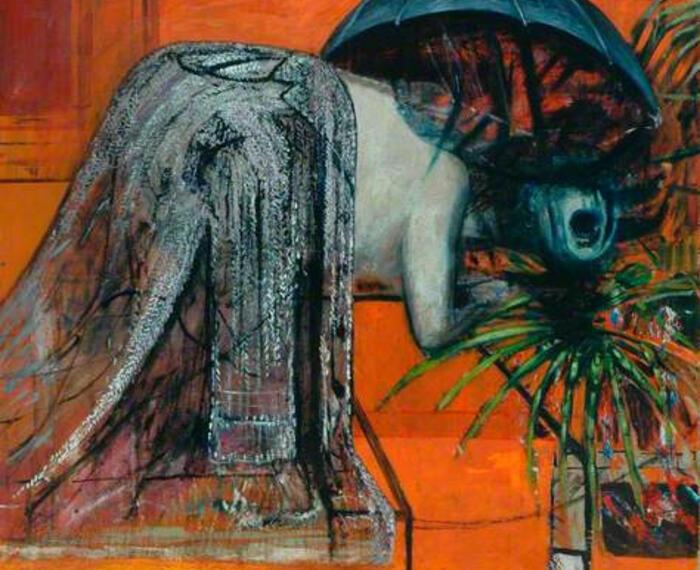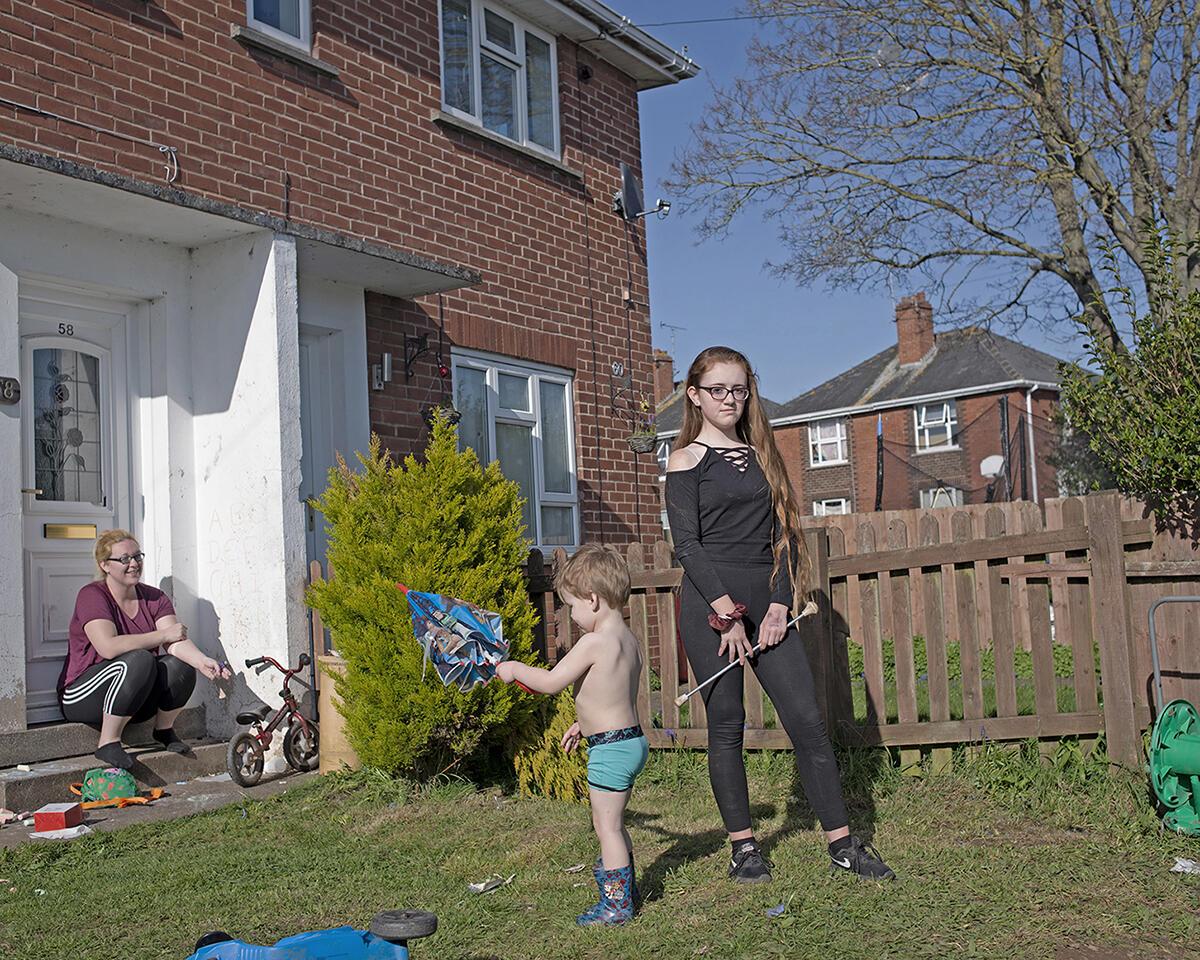


The Contemporary Art Society’s Rapid Response Fund has bought 106 works of art for 16 museums across the UK, financially supporting artists and helping museums reach out to new audiences as they beginning their re-opening programmes as coronavirus-based restrictions ease.
The final round of acquisitions includes a drawing made in lockdown by Claudette Johnson, recent photographs of a community in during the height of the pandemic by Exeter-based photographer Michelle Sank and a mixed-media installation investigating the surveillance of Black bodies by Keith Piper, a founder of the BLK Art Group. This is the final round of funding as part of the Rapid Response Fund, which has seen £234,000 spent on museums around the UK.
A self-portrait by Claudette Johnson, an artist associated with the BLK Art Group, founded in Wolverhampton in 1979, has been acquired for the Herbert Art Gallery & Museum in Coventry as it prepares to participate in Coventry City of Culture in 2021. Entitled Doing Lines 1 (Lockdown) Line Journeys, 2020, the oil pastel on paper drawing was created in lockdown. Johnson says “this is part of a series of larger scale 'warm-up' drawings - the equivalent of scales practice for a pianist. I make them when I have no sitters when I want to work from life, as a way of exploring line, trying to find a new way across a familiar body; when I want to work freely without too much reflection but at the same time with deep concentration.”
The piece will link to an exhibition at the gallery opening this autumn on the theme of Decentring, moving art historical narratives away from those that prioritise Western perspectives.
Francis Ranford, Cultural and Creative Director, Herbert Art Gallery & Museum, said: “Claudette Johnson is widely recognised as one of the most accomplished figurative artists working in Britain today and her drawings of Black men and women powerfully capture the character and humanity of her subjects. In fact the Herbert first exhibited Johnson’s work in 1983 as part of a ground breaking exhibition by the BLK Art group, so it’s wonderful to finally be able to add an example of her work to the permanent collection. She is an artist whose work we have long been interested in and we’re sure that this work will engage and inspire our audiences.”
Keith Piper, another founder member of the BLK Art Group, has also been supported through the Rapid Response Fund, with his multi-media installation Surveillance: Tagging the Other (1991) being acquired for The New Art Gallery Walsall.
This work was created in response to issues arising in the run-up to the formation of the European Union in 1992. The four monitors, installed in a row, show the artist's head being a target of surveillance and control. The Black body is scrutinised in terms of ethnicity, gender, citizenship and appearance. Sound is an important part of the work, featuring fragments of news reports related to the rise of racist attacks, anti-Semitism and right-wing tendencies across Europe.
Keith Piper, artist, said: “I am particularly excited that this work has found a home in the collection of the New Art Gallery Walsall during a period in which the European debate has arrived at the critical moment of ‘Brexit’. I hope that having this work in the collection will stimulate ongoing debate and examination of what has been a watershed period of recent British history.”
Stephen Snoddy, Director, The New Art Gallery Walsall, said: "Keith has strong connections with our region, having grown up in Birmingham, studied in Coventry and Nottingham (as well as London) and of course, he was a founder member of the highly influential BLK Art Group based in Wolverhampton. Though this work was created in 1991, it remains hauntingly pertinent today following the death of George Floyd and the demands for racial equality that have followed. It also connects with wider issues around surveillance and control in the wake of the coronavirus pandemic. In the longer term, the work will remain witness to turbulent times in British history and the struggles for racial equality. We plan to present the work next year, either as a stand-alone work or as part of a major solo exhibition we are developing with the artist for Autumn 2021."
The Rapid Response Fund has also supported Exeter-based artist Michelle Sank, acquiring a series of 8 photographs entitled Breathe, 2020, for Royal Albert Memorial Museum & Art Gallery, Exeter. They were taken in March and April 2020 whilst the artist was isolated from her partner and social group during lockdown.
Michelle Sank, artist, said: “I have been documenting – first with social isolation and then with lockdown – how people have managed private and public spaces during Covid on my daily walks in a neighbouring area “Burnthouse Lane” where I live in Exeter, Devon. This is an area that has a strong sense of community with a mix of social and ethnic diversity living side-by-side. I have been drawn to how people of all ages have negotiated this new way of being and how their interaction with these spaces has unfolded.”
Sank is an internationally acclaimed social documentary photographer whose work explores contemporary social issues. The series will be displayed in a new exhibition titled Funded with Thanks, with the artist leading walks around Exeter for the museum’s audiences.
Cllr Rachel Sutton, Deputy Leader & Portfolio Holder for Climate & Culture, Exeter City Council, said: "The Covid-19 lockdown of 2020 has had a profound impact on the city and people of Exeter and we wanted RAMM’s collections to reflect this remarkable time. Michelle Sank’s evocative images capture those weeks of empty streets, tranquillity and social isolation. They also illustrate the community spirit and human resilience that allowed people to survive such extraordinary circumstances. Acquiring the photographs and displaying them at RAMM will help us to reach out to new audiences and tell their personal stories of Exeter’s lockdown."
Caroline Douglas, Director, Contemporary Art Society, said: “Every acquisition through the Rapid Response Fund reflects the sensibility of the times we are living through, and some have also opened up powerful historical perspectives. While every successful application was awarded on its own merits, the circumstances of their entry into the museum collections will always be a part of their story. Across the country, museums are beginning to open their doors again. Now more than ever before we will value them as havens for contemplation and solace. Their collections are touchstones for our identity and essential humanity. Our museums connect us to our history, but they also play a vital role in helping us to process our experience of the present.”
In addition, four further acquisitions (seven in total) have been made through the Rapid Response Fund in July 2020. These have included:
The CAS Rapid Response Fund, in partnership with Frieze London, is a response to the Covid-19 pandemic to support both artists and museums across the UK. Museums which are members of the Contemporary Art Society are invited to apply to buy art and craft that will support their civic role when they reopen after the lockdown is lifted.
The fund is designed to support as many different artists and local museums as possible, based on the understanding that our museums will play a vital role in our communities as we exit the crisis. The money raised purchases artworks by British-based artists, providing financial support to artists, technicians and art handlers, many of whom work on a freelance basis and have seen their income streams decimated over recent weeks, due to the Covid-19 pandemic.
The CAS Rapid Response Fund also ensures that when museums reopen, they are able to reach out to their communities through new acquisitions, playing a vital role in civic healing and mental wellbeing.
The fund has raised £234,000, which has supported 16 acquisitions. £109,000 was raised through the generosity of CAS Patrons and a further £125,000 was raised through the CAS’s first crowdfunding campaign, which closed on 10 June 2020. People who donated £35 received a limited-edition facemask designed by top artists – David Shrigley, Eddie Peake, Linder and Yinka Shonibare. £120 bought a pack of all four.
The Contemporary Art Society’s partnership with Frieze London allowed the campaign to reach even more art lovers and collectors, both attendees to the art fairs and readers of the magazines.
Rapid Response Fund applications were reviewed by the 2020 CAS Acquisitions Advisory Committee, an external panel chaired by Caroline Douglas, Director of the CAS, consisting of leading curators, writers and artists (full committee list in notes to editors).